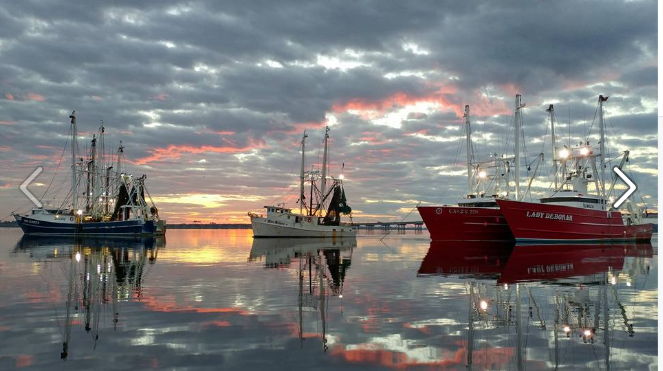 Above is a picture of shrimp boats Tuesday morning at Union Point, New Bern, North Carolina. There were there so that their owners and crew could attend the meeting described below. We need to make sure we protect their livelihood.
Above is a picture of shrimp boats Tuesday morning at Union Point, New Bern, North Carolina. There were there so that their owners and crew could attend the meeting described below. We need to make sure we protect their livelihood.
Yesterday I attended the Joint Meeting of the Northern, Southern, Finfish, Habitat and Water Quality, and Shellfish/Crustacean Advisory Committee at the Riverfront Convention Center in New Bern, North Carolina. I am not a fisherman (I haven’t even done a lot of swimming in the ocean since I saw “Jaws.”), and I really don’t know a lot about fishing. I have learned over the years, however, that often the best conservationists are the people who hunt and fish because they respect the environment and observe changes in the population of the animals they are hunting or fishing. The meeting was called as a public meeting to discuss a petition from the North Carolina Wildlife Federation (NCWF) to change the rules on catching shrimp in the waters of North Carolina. One of my sources tells me that the impetus behind the petition is the Coastal Conservation Association (CCA), which has in the past advocated for regulations that would severely limit commercial fishing.
There were three people who spoke in favor of the rule change—Blakely Hilderbrand, an attorney for the Southern Environmental Law Center, David Knight, a policy advisor for the North Carolina Wildlife Federation, and Jack Travelstead.
The three NCWF representatives painted a bleak picture of fishing in North Carolina if the new regulations were not passed. They mentioned that all the other states on the east coast of America have passed these regulations. Then the people in the other groups got to ask questions. It came out in the questioning that the population of one particular fish that the NCWF claimed was threatened was not threatened according to the North Carolina Division of Marine Fisheries. It was also noted that the states that had already enacted the laws that the NCWF was requesting had also seen drops in certain fish populations. It appeared that the penalties imposed on the shrimp fishermen didn’t help anyone except foreign countries importing shrimp. It was also noted that there are numerous variables that impact fish population—upstream pollution, chemicals entering the water from activities on the shore or upstream, storms, weather conditions, etc. I should also note here that one of the characteristics of the North Carolina coast is that a severe storm can change inlets and water current patterns. This would also impact the fish population.
At the end of the meeting all of the groups (other than the NCWF) voted to deny the petition to change the laws. This is not, however, the end of the story.
According to the North Carolina Marine Fisheries Commission website, the next public meeting will be in Wilmington, North Carolina, on February 15th and 16th. This issue will be discussed at that meeting. The decision will rest with the North Carolina Marine Fisheries Commission. I sincerely hope that they understand that the rules proposed in this petition could end the shrimp industry in North Carolina and eventually put the commercial fishermen out of business. There is no positive side to these regulations—they will not increase the fish population, they will only hurt the fishermen.
